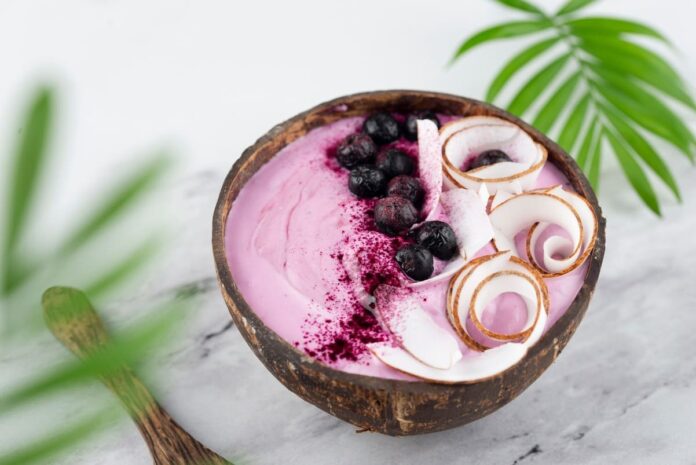Acai berries have become super popular lately, especially in smoothies and bowls. They’re known for being healthy and tasty, but if you’re watching your blood sugar, you might be wondering: what’s the glycemic index (GI) of acai? Is it okay for people with diabetes or prediabetes?
Let’s break it down in simple terms.
What Is the Glycemic Index (GI)?
The glycemic index is a number that tells us how quickly a food raises our blood sugar levels. It goes from 0 to 100:
- Low GI: 55 or less
- Medium GI: 56-69
- High GI: 70 and above
Foods with a low GI are better for blood sugar control because they are digested slowly, causing a slower rise in glucose levels.
Nutritional Profile of Acai Berries
Acai berries are low in sugar and high in fiber, which helps keep your blood sugar stable. They’re also packed with antioxidants, healthy fats, and essential nutrients.
Here’s a quick look at the nutrition in 100 grams of unsweetened acai puree:
| Nutrient | Amount |
|---|---|
| Calories | 70 kcal |
| Carbohydrates | 4 grams |
| Sugar | 2 grams |
| Dietary Fiber | 2 grams |
| Protein | 1 gram |
| Fat | 5 grams |
| Saturated Fat | 1.5 grams |
| Vitamin A | 750 IU |
| Calcium | 20 mg |
| Iron | 0.5 mg |
| Antioxidants (ORAC) | Very High |
Acai Glycemic Index Value
Acai has a very low glycemic index, thanks to its low sugar and high fiber content. While an exact GI number isn’t always listed, it’s estimated to be around 15-25, which is considered low.
That means acai doesn’t spike your blood sugar quickly and is safe in moderation, even if you have diabetes.
Is Acai Safe for Diabetics?
Yes, unsweetened acai is generally safe for people with diabetes. It has very little sugar and lots of fiber. However, always check the label. Some acai products (like frozen packs or juices) come with added sugars, which can raise your blood sugar quickly.
Pro tip: Always go for unsweetened acai puree or powder.
Health Benefits of Acai Berries
Besides being blood sugar-friendly, acai has many other benefits:
- Fights inflammation
- Boosts heart health
- Supports skin health
- Rich in antioxidants (especially anthocyanins)
- May improve cholesterol levels
Best Ways to Eat Acai for Stable Blood Sugar
Here are some ideas:
- Smoothies: Mix acai with spinach, unsweetened almond milk, and a scoop of protein powder.
- Bowls: Use a base of acai puree with low GI toppings like chia seeds, nuts, and berries.
- Powder: Add to oatmeal or yogurt for an antioxidant boost.
Avoid adding honey, sugary granola, or sweetened yogurts.
Who Should Limit Acai Consumption?
While acai is great for most people, you might want to limit it if:
- You’re buying sweetened versions with added sugar
- You’re on a strict low-carb or keto diet (watch portion sizes)
Final Thoughts: Should You Include Acai in a Low GI Diet?
Definitely! Acai is a low GI, nutrient-packed superfruit that fits well in a blood sugar-friendly diet. Just stick to unsweetened forms and combine with other low-GI foods for best results.
FAQs
Is acai high in sugar?
No, plain acai has very low natural sugar. Watch out for sweetened versions though.
Can I eat acai daily with diabetes?
Yes, in moderate amounts and unsweetened form, it’s safe and beneficial.
Is acai keto-friendly?
In small portions, unsweetened acai can fit into a keto diet due to its low net carbs.
What is the glycemic index of acai berries?
Acai berries have a low glycemic index, generally below 55, making them a good option for blood sugar control.
Is acai good for diabetics?
Yes, acai is considered diabetic-friendly due to its low glycemic index and high antioxidant content.
What is the glycemic load of acai?
Acai has a low glycemic load, especially when consumed without added sugars or sweetened toppings.
Does an acai bowl have a high glycemic index?
Acai bowls can have a high glycemic index depending on ingredients like honey, granola, and fruits with high sugar content.
Is acai a low glycemic fruit?
Yes, acai is naturally low glycemic, especially when consumed in its pure, unsweetened form.
How can I make a diabetic-friendly acai bowl?
Use unsweetened acai, low-GI fruits (like berries), chia seeds, and avoid sugary granola or syrups.
Is frozen acai glycemic index the same as fresh?
Yes, frozen unsweetened acai pulp has a similar glycemic profile to fresh acai berries.






